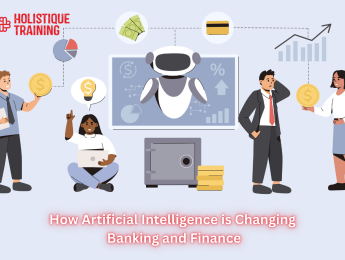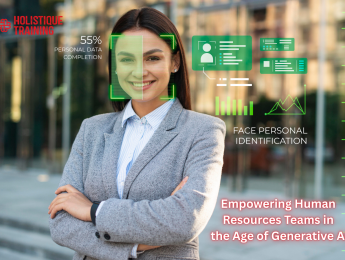- Table of Contents
- Introduction
- The Evolution of AI in Banking
- Key Applications of AI in the Banking Sector
- Customer Service and Engagement
- Fraud Detection and Risk Management
- Credit Assessment and Lending
- Investment and Wealth Management
- Regulatory Compliance and Reporting
- Operational Efficiency and Automation
- Benefits of AI Integration in Banking
- Enhanced Efficiency
- Improved Customer Experience
- Cost Reduction
- Better Decision-Making
- Challenges and Risks Associated with AI in Banking
- Data Privacy Concerns
- Regulatory Compliance
- Bias and Fairness
- Job Displacement
- Future Trends of AI in the Banking Industry
- Generative AI: Enhancing Customer Service and Fraud Prevention
- Predictive Analytics: Anticipating Customer Needs and Market Trends
- AI-Driven Personalization:
- Integration with Emerging Technologies:
- AI in Startup Investment and Innovation
- Conclusion
Introduction
Artificial Intelligence is no longer just a buzzword, it’s a game-changer in the world of banking. From the way we open accounts to how we get financial advice, AI is reimagining every step of the customer journey. It’s helping banks move faster, think smarter, and connect with people on a more personal level. Behind the scenes, AI is streamlining operations, detecting fraud in real time, and analyzing massive amounts of data to make smarter decisions. On the frontlines, it’s powering 24/7 support, tailoring financial recommendations, and making banking feel less like a chore and more like a conversation. As AI continues to evolve, it’s not just enhancing banking, it’s redefining what’s possible.
The adoption of AI in banking has progressed from simple automated systems to complex algorithms capable of predictive analysis and decision-making. Initially utilized for basic tasks like transaction processing, AI now plays a crucial role in areas such as customer service, fraud detection, and investment strategies.
Key Applications of AI in the Banking Sector
Customer Service and Engagement
Artificial Intelligence (AI) has profoundly transformed customer service within the banking sector, primarily through the deployment of AI-powered chatbots and virtual assistants. These intelligent systems are designed to handle a multitude of customer interactions, offering 24/7 support and managing routine inquiries such as balance checks, transaction histories, and account management. This continuous availability not only enhances customer satisfaction but also significantly reduces operational costs for banks. For instance, a study published in Computers in Human Behavior found that chatbots serve as effective tools for automating customer service, with substantial potential to deliver high-quality assistance.
Beyond basic inquiries, AI virtual assistants are increasingly capable of handling more complex tasks, including processing utility payments, providing reminders for upcoming bills, and even scheduling payments to prevent late fees. This level of automation streamlines banking operations and offers a personalized experience for customers. An article from BAI Banking Strategies highlights that AI banking assistants can automate and anticipate utility payments, thereby enhancing customer convenience.
In summary, AI has the potential to significantly enhance customer service and engagement in banking by providing efficient, round-the-clock support and automating routine tasks. Nevertheless, to fully realize these benefits, banks must address challenges related to customer trust, ensure high-quality design and implementation of AI systems, and continuously strive to meet evolving customer expectations.
Fraud Detection and Risk Management
Artificial intelligence (AI) has revolutionized fraud detection and risk management in banking by enabling real-time analysis of vast transaction data to identify anomalies indicative of fraudulent activities. This proactive approach enhances security and reduces false positives, improving customer experience. For instance, J.P. Morgan reported a 15-20% reduction in account validation rejection rates after implementing AI-powered payment screening.
However, the rapid advancement of AI also benefits cybercriminals, who use generative AI to develop sophisticated attack methods. A survey of 600 bank cybersecurity executives revealed that 80% believe hackers are leveraging AI faster than banks can respond.
To counter these threats, collaborative efforts are underway. In the UK, major banks and tech companies have agreed to share live data on fraud, facilitating earlier detection of scams.
In summary, while AI significantly enhances fraud detection and risk management in banking, it also necessitates continuous adaptation to emerging threats and collaborative strategies to effectively safeguard financial assets and maintain customer trust.
Credit Assessment and Lending
Artificial Intelligence (AI) is revolutionizing credit assessment and lending by enhancing the accuracy and efficiency of evaluating borrowers' creditworthiness. Key benefits include:
- Enhanced Accuracy: AI algorithms analyze extensive data sources, including alternative data like social media activity, to provide a comprehensive view of an individual's financial behavior.
- Accelerated Decision-Making: Automating data analysis speeds up loan application processing, benefiting both lenders and borrowers.
- Financial Inclusion: AI enables assessment of individuals with limited or no formal credit histories by evaluating alternative data, expanding access to credit.
- Improved Risk Management: AI models identify complex patterns indicative of potential defaults, enhancing lenders' ability to manage risk.
However, challenges include ensuring transparency and interpretability of AI models to maintain regulatory compliance and customer trust, and addressing potential biases to prevent discriminatory lending practices. Overall, AI's integration into credit assessment and lending holds significant promise for enhancing financial inclusion and optimizing risk management, provided that its implementation is handled with careful consideration of ethical and regulatory implications.
Investment and Wealth Management
Artificial Intelligence (AI) is revolutionizing investment and wealth management by enhancing the accuracy and efficiency of analyzing market trends and optimizing portfolio allocations.
AI-driven platforms assist advisors in making informed decisions and automating routine tasks, which has led to significant improvements in client engagement and portfolio management.
For instance, robo-advisors use algorithms to provide personalized financial advice, making wealth management services more accessible to a wider range of clients. AI systems can also process unstructured data, such as news articles and social media, to gauge market sentiment and predict price fluctuations. As AI transforms wealth management, Chartered Financial Analyst (CFA) Certification becomes increasingly valuable, as it equips financial professionals with the tools to better understand AI applications in investment strategy, ensuring they can interpret and apply data-driven insights effectively.
Regulatory Compliance and Reporting
In regulatory compliance and reporting, AI streamlines the monitoring and interpretation of complex regulations, ensuring that financial institutions adhere to legal standards and avoid costly errors. AI applications can analyze vast amounts of regulatory documents, automate compliance reporting processes, and continuously monitor transactions, identifying anomalies that may signal compliance issues.
This greatly enhances the efficiency of the reporting process while reducing human error. With regulations becoming more intricate, AI offers a scalable solution for managing compliance obligations effectively. Additionally, AI plays a significant role in ensuring transparency and avoiding bias in financial institutions' operations.
Professionals seeking to understand the nuances of regulatory compliance could benefit from courses like Understanding International Financial Reporting Standards (IFRS),which helps professionals grasp global accounting standards. These standards are critical when implementing AI solutions that manage complex reporting requirements across different jurisdictions. As financial institutions increasingly rely on AI, ensuring adherence to international standards will be crucial for maintaining regulatory compliance.
Operational Efficiency and Automation
AI streamlines internal banking operations by automating routine tasks such as data entry, document processing, and customer onboarding. This automation leads to significant cost savings and allows employees to focus on more strategic initiatives.
Benefits of AI Integration in Banking
Enhanced Efficiency
AI significantly improves operational efficiency by automating repetitive tasks such as transaction processing and basic customer support. This automation frees up staff to focus on more complex issues, improving productivity and allowing banks to process larger volumes of transactions more accurately and quickly, ultimately streamlining operations.
Improved Customer Experience
AI-powered tools, such as chatbots and personalized financial recommendations, enhance the customer experience by offering tailored services based on individual needs. These tools not only provide faster, round-the-clock support but also help banks engage customers on a more personal level, increasing satisfaction and customer loyalty.
Cost Reduction
The automation of tasks previously handled by humans allows banks to reduce operational costs significantly. By implementing AI systems, banks can lower labor costs, minimize errors, and improve workflow efficiency, all of which contribute to long-term savings while maintaining high service levels.
Better Decision-Making
AI’s ability to analyze vast amounts of data provides banks with actionable insights that improve decision-making. By identifying patterns and trends, AI helps banks anticipate customer needs, manage risks more effectively, and make informed strategic decisions, thus enhancing their overall competitiveness in the market.
The Chartered Financial Analyst (CFA) Certification course offers an in-depth understanding of financial analysis and decision-making strategies. By acquiring CFA credentials, banking professionals can enhance their ability to make informed, data-driven decisions, aligning with the insights generated through AI systems.
Banking Function | Traditional Approach | With AI Integration |
Customer Service | Manual support, limited hours | 24/7 AI chatbots with instant responses |
Loan Processing | Lengthy, manual assessments | Automated credit scoring and approval |
Fraud Detection | Reactive, based on past data | Real-time monitoring and predictive alerts |
Financial Advice | One-size-fits-all recommendations | Personalized insights using behavioral data |
Challenges and Risks Associated with AI in Banking
Data Privacy Concerns
AI systems in banking require access to sensitive customer data, raising significant concerns about privacy and security. Banks must ensure that robust security measures, such as encryption and data anonymization, are in place to protect this data and comply with privacy regulations, ensuring customer trust in AI-driven processes.
Regulatory Compliance
As AI technologies evolve, so too do the regulatory requirements governing their use. Ensuring compliance with these regulations, which often differ across jurisdictions, can be complex. Banks must stay updated on the latest rules and ensure their AI models are transparent, auditable, and aligned with regulatory standards to avoid penalties.
Bias and Fairness
AI models are only as reliable as the data they are trained on, and biased or incomplete data can result in unfair outcomes. Banks must regularly monitor and audit AI systems to ensure they operate fairly, avoiding discrimination in critical areas like lending or credit scoring.
Job Displacement
While AI can improve efficiency, it can also lead to job displacement as automation takes over routine tasks. Banks must strike a balance by upskilling their workforce and creating new opportunities to mitigate the impact of automation, ensuring employees are prepared for new roles in an AI-driven banking environment.
Future Trends of AI in the Banking Industry
The future of AI in banking is on the brink of major transformation, as technologies continue to evolve at a rapid pace. As the financial industry embraces the power of artificial intelligence, several key trends are emerging that promise to redefine how banks operate, deliver services, and engage with customers. Here’s a closer look at some of these exciting advancements:
Generative AI: Enhancing Customer Service and Fraud Prevention
Generative AI, a form of artificial intelligence that creates new content or data based on existing patterns, is poised to transform both customer service and fraud prevention in the banking industry. Here's how:
In Customer Service
- Smarter Virtual Assistants
Generative AI powers highly sophisticated chatbots and virtual agents that can understand and respond to complex customer queries in natural, conversational language. - More Human-Like Interactions
These AI systems simulate real conversations, offering customers a more personalized, seamless, and intuitive experience. - Continuous Learning
With each interaction, generative AI improves, learning from previous conversations to boost its accuracy and effectiveness over time.
In Fraud Prevention
- Predicting Potential Fraud Scenarios
Generative AI can simulate possible fraudulent activities by analyzing large datasets of past fraud patterns, helping banks stay one step ahead. - Proactive Risk Mitigation
By identifying vulnerabilities before they’re exploited, AI allows banks to prevent crimes like money laundering, credit card fraud, and identity theft before they occur. - Enhanced Security Measures
This predictive power makes generative AI an essential tool for strengthening security and building trust with customers.
As generative AI continues to evolve, its ability to enhance customer experience while reinforcing fraud defenses makes it a critical asset for the future of banking.
Predictive Analytics: Anticipating Customer Needs and Market Trends
Predictive analytics, powered by machine learning algorithms that analyze historical data to forecast future trends, is becoming a cornerstone of AI in banking. It allows banks to move from reactive to proactive, anticipating needs and seizing opportunities before they arise. Here's how:
Anticipating Customer Needs
- Tailored Financial Solutions
By analyzing a customer’s past spending and behavior, banks can predict when they might need a loan, mortgage refinancing, or a new savings plan and offer it at just the right moment. - Personalized Experiences
Predictive models help financial institutions go beyond generic recommendations, enabling them to provide relevant, timely, and personalized products and services.
Responding to Market Shifts
- Macroeconomic Forecasting
AI-driven analytics can monitor real-time data to predict broader financial trends, like interest rate changes, stock market fluctuations, or looming downturns. - Strategic Adaptation
With early insights into market shifts, banks can adjust strategies, refine offerings, and better manage risk, staying agile in an ever-changing financial landscape.
In short, predictive analytics equips banks with the foresight they need to serve their customers better and navigate market complexity with confidence.
AI-Driven Personalization:
As customers become more discerning and seek personalized experiences, banks are increasingly turning to AI to deliver tailored financial products and services. AI-driven personalization goes beyond traditional demographic segmentation, focusing on a deeper understanding of each customer’s unique preferences, behaviors, and goals. Here’s how it works:
Customizing Financial Services
- Personalized Financial Advice
AI analyzes a customer’s transaction history, online behaviors, and social media activity to offer bespoke financial advice and investment recommendations that align with their specific needs. - Tailored Loan Products
By considering a customer’s financial situation and risk profile, AI helps banks provide customized loan offers, making financial solutions more relevant and accessible.
Targeted Marketing Campaigns
- Relevant Promotions
AI enables banks to craft highly personalized marketing messages, offers, and promotions that resonate with individual customers, based on their data and interests. - Increased Customer Satisfaction
This level of personalization builds trust, enhances loyalty, and fosters stronger, more meaningful relationships between customers and their banks.
By utilizing AI to deeply understand customer needs, banks are able to elevate the customer experience, driving satisfaction and loyalty in a competitive market.
Integration with Emerging Technologies:
One of the most exciting trends in the future of banking is the integration of AI with emerging technologies such as blockchain and the Internet of Things (IoT). When combined with AI, blockchain has the potential to revolutionize how banks handle transactions, secure data, and verify identities. Blockchain’s decentralized, transparent nature allows for more secure and efficient data exchange, while AI can optimize and automate these processes. For example, AI could help verify blockchain transactions in real time, identify irregularities, and detect fraud, making the blockchain even more secure and efficient for financial institutions.
Similarly, the combination of AI and IoT in banking opens up a new world of possibilities. IoT devices, such as smart devices and connected assets, generate vast amounts of data that can be analyzed by AI to provide deeper insights into customer behaviors, transaction patterns, and even market trends.
For instance, IoT-enabled devices could monitor the usage of credit cards or loans in real-time, enabling banks to offer dynamic interest rates based on a customer’s financial activity or even predict when a customer is likely to need additional funds based on their purchasing behavior.
The fusion of AI with blockchain and IoT offers the potential for highly secure, efficient, and intelligent banking systems that are capable of handling a range of tasks from real-time fraud prevention to personalized financial services. These emerging technologies will reshape the banking industry, making transactions faster, more secure, and more relevant to each customer’s unique financial journey.
AI in Startup Investment and Innovation
AI has revolutionized the world of startup investment, making the process more data-driven and efficient than ever before. Venture capitalists and investors are increasingly relying on artificial intelligence to spot promising startups and assess their potential for growth. Here’s how AI is changing the game:
- Smarter Startup Selection
AI gives investors access to valuable data that was previously hard to capture, like real-time market trends, competitor activity, and customer sentiment. This allows for more informed, timely decisions. - Early Success Prediction
By processing massive volumes of financial and operational data, AI can detect early indicators of a startup’s future success, even in fast-moving or unpredictable industries. - Data-Driven Over Gut-Driven
Traditional investment methods often relied on instinct or personal networks. Now, machine learning models can forecast a startup’s performance with impressive accuracy, reducing guesswork. - Faster, Smarter Due Diligence
AI tools streamline the due diligence process by quickly analyzing financials, assessing risk, and evaluating founder backgrounds. This saves time and highlights potential red flags or hidden opportunities. - Spotting Trends Before They Go Mainstream
AI-powered platforms are helping investors identify trends in sectors like tech, healthcare, and climate innovation before they gain widespread attention — giving them a competitive edge. - Real-Time Portfolio Optimization
With predictive analytics, AI helps investors fine-tune their strategies on the go, ensuring portfolios stay aligned with the most promising opportunities.
As entrepreneurs continue to bring bold, innovative ideas to life, AI gives investors a sharper, more dynamic lens to evaluate them.
Moreover, AI’s ability to learn and adapt makes it an essential tool for refining investment strategies. With predictive analytics, investors can adjust their portfolios in real-time, ensuring they are always aligned with the most promising growth opportunities. Courses likeStrategic Venture Capital: Investing in Emerging Startups can provide further insights into the intersection of AI and venture capital, teaching how AI tools are helping investors identify high-growth startups more efficiently.
Conclusion
AI isn’t just changing the way banks operate, it’s reshaping how people experience money. From smarter fraud prevention to more personalized support, AI is helping the financial world feel faster, safer, and more intuitive. Of course, challenges remain, but with thoughtful and strategic use, AI can be a powerful tool to build trust, drive innovation, and create banking that truly works for everyone.
If you want to dive deeper into how AI is shaping the future of finance, check out our courses and start learning how to harness the power of AI in banking today.
























